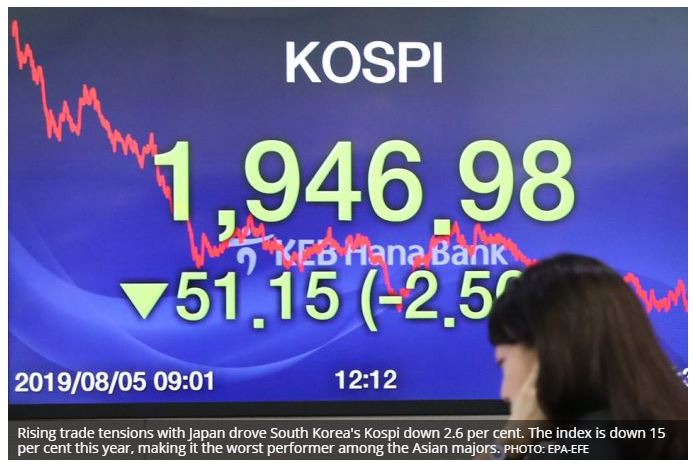Asian markets get that sinking feeling on rising trade war pains
ASIAN equities had no time to catch their breath on Monday, falling end over end in huge losses as traders anticipated more flare-ups from Washington after China’s yuan slumped to a decade low and stoked fears of rising trade-war pains and the spectre of a currency war.
Investors ditched stocks and dashed instead to the safe-haven trio – gold, Japanese yen and treasuries – as chances of a quick fix to the US-China trade war faded away.
Growing trade animosity between Japan and South Korea and worsening civil tensions in Hong Kong added to the mix of fear factors.
It was grim across the board as all key benchmarks in Asia tumbled by more than 1 per cent. In Singapore, the Straits Times Index fell 2 per cent with banks, property and technology stocks among the worst performers. Malaysia was down 1 per cent, while Japan’s key index lost 1.7 per cent, extending last Friday’s big 2.1 per cent loss as a stronger yen dragged down export-sensitive stocks.
Rising trade tensions with Japan drove South Korea’s Kospi down 2.6 per cent. The index is down 15 per cent this year, making it the worst performer among the Asian majors.
It cut deepest in Hong Kong. The Hang Seng Index plunged 2.9 per cent after a nine-week long unrest spiralled into travel chaos and strikes, pummelling business sentiment and the city’s reputation as a stable financial centre.
Key regional gauges were in the red, with the MSCI Asia-Pacific and MSCI Emerging Market indices sinking 2.7 per cent and 2 per cent respectively.
Many Asian currencies including the Singapore dollar, South Korean won, Malaysian ringgit and Indonesian rupiah came under pressure against the US dollar on Monday, as the prospect of a currency war and the return of tit-for-tat trade moves between the world’s two largest economies threatened.
Much of that was led by fresh worries that came to play after the closely-managed Chinese yuan broke above the seven-yuan-per-US-dollar psychological mark; it jumped to 7.11 at one point.
This was the lowest since May 2008, when the People’s Bank of China (PBoC) set its daily reference rate weaker than 6.9 per dollar for the first time this year.
Smartkarma’s insight provider, Thomas Schroeder of Chart Partners Group, said: “USD/CNH (offshore Chinese yuan) above seven is a game changer for Asian equity risk and FX.”
In the past, Beijing had resisted the currency weakening beyond seven, in large part to avoid triggering major capital outflows.
But now, experts expect China to allow further falls in the yuan to offset trade war strains and preserve its export competitiveness – a hardened policy stance by China that may earn it the ire of US President Donald Trump, who has frequently accused China of currency manipulation and openly complained about a strong US dollar.
Oxford Economics said in a note: “Despite this breach of the seven mark, we still don’t expect Chinese policy-makers to be comfortable with major weakening of the CNY. The concerns about triggering large financial capital outflows remain.”
Monday’s development underscores that China’s currency is becoming more market-determined and flexible, which means it is likely to be more volatile. This will especially affect exchange rates of other Asian economies, it added.
The latest development in China follows last week’s curve ball pitched by no less than Mr Trump, who then declared that the US would slap more tariffs on Chinese goods from September; he also threatened to raise the tariffs further if trade talks stall.
Morgan Stanley said: “Trade tensions have pushed corporate confidence and global growth to multi-year lows. Tariffs announced on Aug 1 raise downside risks significantly. If US lifts tariffs on all imports from China to 25 per cent for four to six months and China takes countermeasures, we believe we would see the global economy entering recession in three quarters’ time.”
Amid the risks of slowing global growth and prolonged trade tensions, major central banks, in particular the US Federal Reserve and the European Central Bank, have shifted into easing mode. But while these measures are helpful in cushioning the downside risks, there are concerns that they may not be enough to trigger a recovery – that is, until the dark clouds of trade woes dissipate.
Citi Global Research said: “The current shock to the global economy from tariffs warrants additional policy insurance. Monetary policy cannot offset tariffs and it also risks more (and excessive) appreciation of risky financial assets”.
Source: https://www.businesstimes.com.sg/stocks/asian-markets-get-that-sinking-feeling-on-rising-trade-war-pains-0


 English
English




